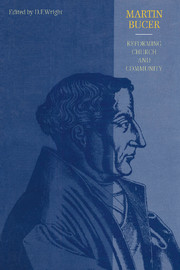Book contents
- Frontmatter
- Contents
- Notes on contributors
- List of abbreviations
- Introduction
- 1 Martin Bucer and the Old Church
- 2 The relation between church and civil community in Bucer's reforming work
- 3 Bucer's influence on Calvin: church and community
- 4 The church in Bucer's commentaries on the Epistle to the Ephesians
- 5 Church, communion and community in Bucer's commentary on the Gospel of John
- 6 Eucharistic communion: impulses and directions in Martin Bucer's thought
- 7 Martin Bucer and the ministry of the church
- 8 Infant baptism and the Christian community in Bucer
- 9 Bucer's ecclesiology in the colloquies with the Catholics, 1540–41
- 10 The Strasbourg Kirchenpfleger and parish discipline: theory and practice
- 11 Ecclesiological motifs behind the creation of the ‘Christlichen Gemeinschaften’
- 12 Martin Bucer in England
- 13 Martin Bucer and the Englishing of the Psalms: pseudonymity in the service of early English Protestant piety
- Bibliography
- Biblical index
- Index of Bucer's works
- Index of modern authors
- General index
2 - The relation between church and civil community in Bucer's reforming work
Published online by Cambridge University Press: 22 September 2009
- Frontmatter
- Contents
- Notes on contributors
- List of abbreviations
- Introduction
- 1 Martin Bucer and the Old Church
- 2 The relation between church and civil community in Bucer's reforming work
- 3 Bucer's influence on Calvin: church and community
- 4 The church in Bucer's commentaries on the Epistle to the Ephesians
- 5 Church, communion and community in Bucer's commentary on the Gospel of John
- 6 Eucharistic communion: impulses and directions in Martin Bucer's thought
- 7 Martin Bucer and the ministry of the church
- 8 Infant baptism and the Christian community in Bucer
- 9 Bucer's ecclesiology in the colloquies with the Catholics, 1540–41
- 10 The Strasbourg Kirchenpfleger and parish discipline: theory and practice
- 11 Ecclesiological motifs behind the creation of the ‘Christlichen Gemeinschaften’
- 12 Martin Bucer in England
- 13 Martin Bucer and the Englishing of the Psalms: pseudonymity in the service of early English Protestant piety
- Bibliography
- Biblical index
- Index of Bucer's works
- Index of modern authors
- General index
Summary
The civil authorities, who exercise the sword and the highest outward power, are servants of God; they ought, therefore, to direct all their abilities, as God in his law has commanded and as the Spirit of Christ himself teaches and urges in all whom he leads, to the end that through their subjects God's name be hallowed, his kingdom extended and his will fulfilled – so far as they can serve thereto by virtue of their office alone. Therefore the spirit of those who want the authorities not to concern themselves at all with Christian activity, is a spirit directed against Christ our Lord, and a destroyer of all good.
In these sentences we encounter the fourteenth of the articles, sixteen in all, that Bucer drew up in the spring of 1533 as a basis for discussion at the Strasbourg synod. It expresses the fundamentals of the new ordering of the church's life in the free imperial city of Strasbourg. Even if Bucer succeeded neither on this occasion nor later in implementing his ideals and objectives, this article outlines both concisely and precisely his conception of the relationship between the church and the representatives of the civic community, and hence of the political power.
The role of civil authority
According to Bucer's persuasion, God has entrusted an essential task to the authorities: they are responsible not only for the earthly welfare of their subjects, but also for their blessedness, their eternal salvation – although admittedly within defined limits.
- Type
- Chapter
- Information
- Martin BucerReforming Church and Community, pp. 17 - 31Publisher: Cambridge University PressPrint publication year: 1994
- 2
- Cited by



